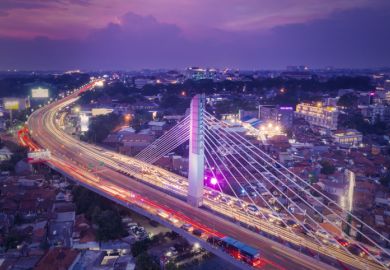As Jakarta rapidly sinks into the ocean, Indonesia’s behind-schedule, controversy-ridden new capital city on the jungle-clad island of Borneo could spell a new era for the archipelago’s universities – but academics believe there is a way to go until Nusantara becomes the international “centre of research and innovation” envisioned.
The ambition for the new capital is bold: a futuristic, sustainable smart city that can propel Indonesia’s economy, supported by a “21st-century education cluster”, including world-class universities.
Two years in, the reality is a little different: a development project that is lacking in both investment and – somewhat ironically, given the situation in Jakarta – a stable water supply.
In June, amid concerns about the progress of the new capital, outgoing president Joko Widodo broke ground on the construction of a new branch of Gunadarma University, the first higher education institution in Nusantara. But analysts are doubtful that top universities, both within Indonesia and internationally, will be rushing to set up in the new capital.
“In my opinion, we will see more impact to Indonesia’s higher education landscape in the long term rather than short term,” said Dorothy Ferary, vice-rector at Satya Terra Bhinneka University.
“With plans to build universities in the planned new capital city, Nusantara, there will be a more even spread of university students in Indonesia. Other existing universities near Nusantara may also reap the benefits of incoming students because students may look for job opportunities in Nusantara.”
Not only does the new city still lack basic infrastructure, there is unlikely to be a mass exodus from Jakarta.
“Perhaps the government might offer very high incentives for these universities to build in the capital city, but at the end of the day in terms of the populations, in terms of the demand, [it] is still located in Jakarta,” said Teguh Yudo Wicaksono, head of the Mandiri Institute, an economic thinktank.
Indonesia has been attempting to attract international universities more widely in recent years, inviting top institutions to establish branch campuses and develop new research centres.
In 2022, Australia’s Monash University opened a branch on the outskirts of the current capital – crucially, on the opposite side of the city to the sinking north Jakarta – while Deakin and Lancaster universities are set to open a joint campus in Bandung, 94 miles from Jakarta.
In a scoping study conducted in 2022 by qualification recognition agency Ecctis on behalf of the British government, the new capital is not even mentioned.
“In terms of feasibility, in terms of the revenue stream and so on and so forth, it’s too costly for these universities to build branches there,” said Dr Yudo.
In March, rumours that Stanford University would build a campus in the new capital were quickly shot down by the institution, which confirmed to Indonesian press that while it was exploring research collaboration opportunities, it would not be putting down bricks and mortar.
Analysts expected that there may be more international interest in research centres but that this too is unlikely to happen immediately.
“It is not easy to build the profile of Nusantara as a centre of research and innovation, particularly at an international level,” said Ms Ferary.
“Compared to other countries, research performance in Indonesia is still relatively low in quantity but particularly in quality. Primarily this is because of the lack of funding.”
Register to continue
Why register?
- Registration is free and only takes a moment
- Once registered, you can read 3 articles a month
- Sign up for our newsletter
Subscribe
Or subscribe for unlimited access to:
- Unlimited access to news, views, insights & reviews
- Digital editions
- Digital access to THE’s university and college rankings analysis
Already registered or a current subscriber?








